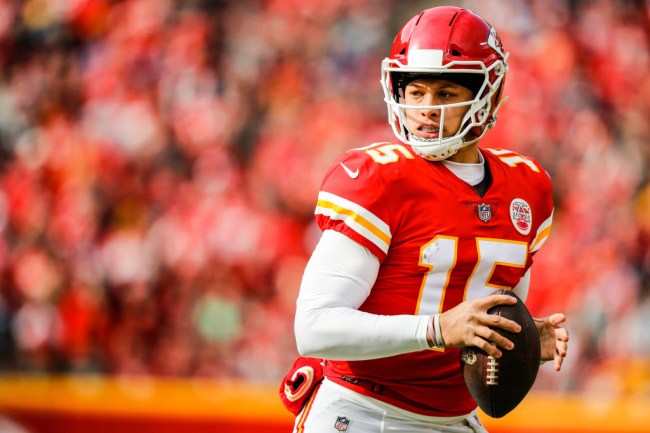
David Eulitt/Getty Images
You’d think that the Kansas City Chiefs organization would have done their homework before drafting Patrick Mahones with the tenth overall pick in the 2017 Draft. They must’ve been too enamored with Mahomes’ NCAA single-game passing record of 734 yards while at Texas Tech or the fact that he was a top prospect for the 2014 Major League Baseball draft to realize that this dude has a glaring red flag.
A Mahomes’ profile piece written by ESPN’s Seth Wickersham takes a deep dive into the life of the 23-year-old Texas boy who leads the league in touchdowns and yards and is second in passer rating through the first nine games of his NFL career.
The piece largely lauded Mahomes for his transcendent abilities, but one snippet caught my eye and it’s been haunting me ever since:
“The other day, in Mahomes’ apartment in the Country Club Plaza neighborhood of Kansas City, his grandfather asked him, “What’s it like to be famous?” For one thing, it means he eats less ketchup. He spent most of his life putting ketchup on everything. He would get bottles of it for his birthday. But now that everyone is watching every move he makes, he is sheepish about ordering ketchup. At a restaurant recently, his mom, Randi, recognized an unfilled desire as he dove into a steak. “Just ask for it,” Randi said. “I know you want it.” Patrick wouldn’t. So she asked for the ketchup and slipped it to him.”
If my father saw someone, anyone put ketchup on his perfectly seared sirloin, he’d backhand him like a middle child–star QB or not. It makes me feel like there’s hope left on the internet for everyone to widely strike down the ketchup/steak pairing.
We've found Pat Mahomes' only flaw: He likes ketchup on his steak 😭
➡️ https://t.co/z4zSwnw0x5 pic.twitter.com/5rSVfVuimE
— Yahoo Sports (@YahooSports) November 14, 2018
https://twitter.com/SheraeSpeaks_/status/1062787964286185472
Server: Anything else for you Mr. Mahomes?
“Don’t say it.”
“Don’t say it.”
“Don’t say it.”
“Don’t say it.”
“Don’t say it.”
“Don’t say it.”
“Don’t say it.”
“Don’t say it.”
“Don’t say it.”
“Don’t say it.”
“Don’t say it.”
“Don’t say it.”
“Don’t say it.”Mahomes: Ketchup!
— Leo Hayden (@leohayden) November 14, 2018
Finding out Patrick Mahomes likes ketchup on steak helps me understand how Ravens fans must have felt that Ray Lewis was a murderer.
— Goose (@GooseSprngsteen) November 14, 2018
Mahomes puts ketchup on his steak.
Chief fans, this your King? https://t.co/nBK5Xjwsiv
— RedDirtSport (@RedDirtSport) November 14, 2018
My dad puts ketchup on steak, spaghetti, mac & cheese, and eggs. Patriarch Mahomes.
— Mick Shaffer (@mickshaffer) November 14, 2018
I'd judge Mahomes for putting ketchup on steak, but I dip my pizza in ranch, so we're even. https://t.co/df0Pof0LUp
— Brooke Pryor (@bepryor) November 14, 2018
#NotMyQB.